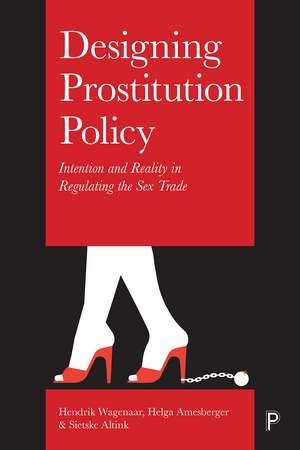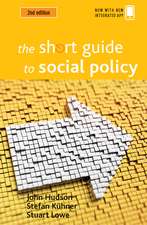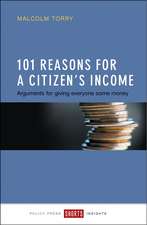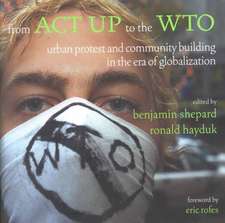Designing Prostitution Policy: Intention and Reality in Regulating the Sex Trade
Autor Hendrik Wagenaar, Sietske Altink, Helga Amesbergeren Limba Engleză Hardback – 25 apr 2017
Most discussions about approaches to regulating prostitution occur at the national level—battles, for example, between prohibition and legalization. In reality, however, the impact of prostitution is felt most keenly at the local level, and it is local measures that can have the greatest effect. This book explores various approaches to regulating prostitution and other sex work at the local level, analyzing their aims and outcomes and offering guidance on designing effective regulations through available policy instruments.
Preț: 834.16 lei
Preț vechi: 1083.33 lei
-23% Nou
Puncte Express: 1251
Preț estimativ în valută:
159.61€ • 167.10$ • 132.07£
159.61€ • 167.10$ • 132.07£
Carte tipărită la comandă
Livrare economică 05-19 aprilie
Preluare comenzi: 021 569.72.76
Specificații
ISBN-13: 9781447324249
ISBN-10: 1447324242
Pagini: 216
Dimensiuni: 159 x 235 x 23 mm
Greutate: 0.64 kg
Editura: Bristol University Press
Colecția Policy Press
ISBN-10: 1447324242
Pagini: 216
Dimensiuni: 159 x 235 x 23 mm
Greutate: 0.64 kg
Editura: Bristol University Press
Colecția Policy Press
Notă biografică
Hendrik Wagenaar is professor of town and regional planning at the University of Sheffield. Helga Amesberger is a senior researcher at the Institute of Conflict Research in Vienna. Sietske Altink has a background in philosophy and is a researcher on the comparative study of prostitution policy. She is a key figure in the prostitution debate in the Netherlands.
Cuprins
Acknowledgements
One Introduction
Dora’s story
The primacy of policy in prostitution
The goals of the book
A reader’s guide to the book
Two Challenges of prostitution policy
The stigma of prostitution and the paradox of control
Prostitution politics as morality politics
Paradoxes of immigration
Obstacles to obtaining reliable numbers about prostitution and sex workers
The ineluctable importance of the local in prostitution policy
Analysing prostitution policy
Three The local governance of prostitution: regulatory drift and implementation capture
Policy implementation as policy formulation with different means
Policy design and policy instruments
Local policymaking in the Netherlands
Local policymaking in Vienna
Conclusion: policy implementation, morality politics and the corrosive effects of discourse
Four The national governance of prostitution: political rationality and the politics of discourse
Introduction: policy subsystems and policy streams
National policy in the Netherlands
National policy in Austria
Conclusion
Five Understanding the policy field: migration, prostitution, trafficking and exploitation
Introduction: prostitution as a complex policy field
Migration, prostitution and coercion
How immigration and labour law shape the ‘modern slavery’ problem
Prostitution and exploitation
Prostitution, trafficking and exploitation: an alternative framework
Six Prostitution policy beyond trafficking: collaborative governance in prostitution
The challenges of prostitution policy revisited: harnessing a complex policy field
Introducing collaborative rationality in prostitution governance
Sex worker advocacy and the state
Governance capacity and collaborative governance
Is collaborative governance in prostitution policy possible?
Seven Summary and conclusion
Appendix: research design and methodology
Goals of the project
Research questions
Design of the study
Partnered research
Data collection
References
Index
One Introduction
Dora’s story
The primacy of policy in prostitution
The goals of the book
A reader’s guide to the book
Two Challenges of prostitution policy
The stigma of prostitution and the paradox of control
Prostitution politics as morality politics
Paradoxes of immigration
Obstacles to obtaining reliable numbers about prostitution and sex workers
The ineluctable importance of the local in prostitution policy
Analysing prostitution policy
Three The local governance of prostitution: regulatory drift and implementation capture
Policy implementation as policy formulation with different means
Policy design and policy instruments
Local policymaking in the Netherlands
Local policymaking in Vienna
Conclusion: policy implementation, morality politics and the corrosive effects of discourse
Four The national governance of prostitution: political rationality and the politics of discourse
Introduction: policy subsystems and policy streams
National policy in the Netherlands
National policy in Austria
Conclusion
Five Understanding the policy field: migration, prostitution, trafficking and exploitation
Introduction: prostitution as a complex policy field
Migration, prostitution and coercion
How immigration and labour law shape the ‘modern slavery’ problem
Prostitution and exploitation
Prostitution, trafficking and exploitation: an alternative framework
Six Prostitution policy beyond trafficking: collaborative governance in prostitution
The challenges of prostitution policy revisited: harnessing a complex policy field
Introducing collaborative rationality in prostitution governance
Sex worker advocacy and the state
Governance capacity and collaborative governance
Is collaborative governance in prostitution policy possible?
Seven Summary and conclusion
Appendix: research design and methodology
Goals of the project
Research questions
Design of the study
Partnered research
Data collection
References
Index
Recenzii
“A splendid, evidence-based analysis of policies related to sexual commerce and labor migration in Europe. Scholars and policy makers will find the book’s findings of tremendous value as they weigh alternative proposals for regulating commercial sex.”














